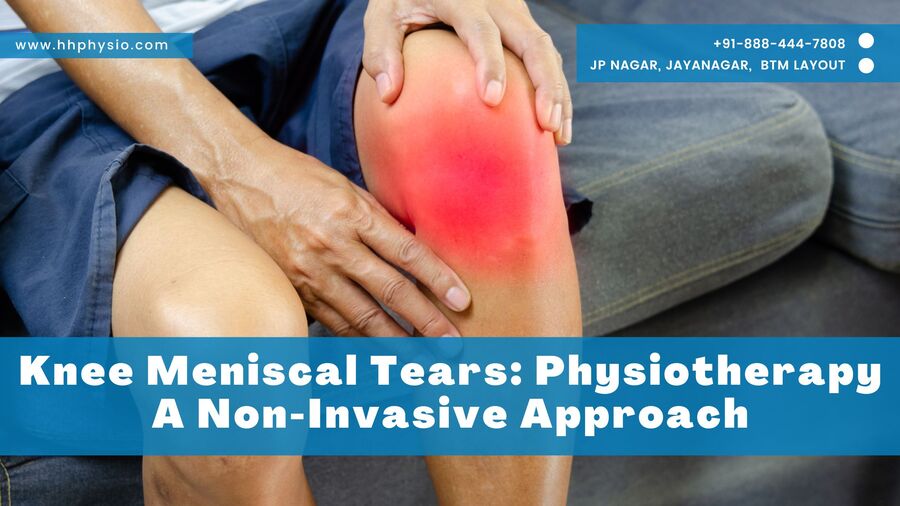Physiotherapy: A Non-Invasive Approach for Healing Knee Meniscal Tears
In recent years, there has been a growing understanding that not all knee meniscal tears require surgery. In fact, physiotherapy has emerged as a viable alternative to surgical intervention, offering promising results in healing and rehabilitating such injuries. This article aims to shed light on the effectiveness of physiotherapy as an excellent non-invasive option for treating knee meniscal tears, highlighting its benefits and success stories.
Understanding Knee Meniscal Tears:
The knee joint is a complex structure that relies on various components, including the meniscus, to maintain stability and facilitate smooth movement. Meniscal tears occur when the rubbery, crescent-shaped discs between the thighbone and shinbone (medial and lateral menisci) get damaged or torn. These injuries can result from sudden twisting, sports-related impacts, or gradual wear and tear due to aging.
Traditional Approach: Surgery
For many years, surgical intervention, such as arthroscopic meniscectomy or meniscal repair, was considered the primary treatment option for meniscal tears. While surgery can be necessary in certain cases, it is invasive and involves potential risks, such as infection, blood clots, or anesthesia-related complications. Moreover, the recovery process can be lengthy, requiring significant time off work and restricting daily activities.
The Rise of Physiotherapy:
Recent scientific studies and clinical trials have shown that physiotherapy can yield outcomes as good as, if not better than, surgical procedures for healing knee meniscal tears. Physiotherapy focuses on non-invasive techniques to restore function, reduce pain, and improve overall mobility.
Benefits of Physiotherapy for Meniscal Tears:
1. Non-Invasive Approach: Physiotherapy offers a conservative, non-surgical approach to treating meniscal tears. It involves a combination of therapeutic exercises, manual therapy techniques, and other non-invasive modalities to promote healing and rehabilitation.
2. Pain Reduction: Physiotherapists employ various pain management techniques, including ultrasound, electrotherapy, and hot/cold therapy, to alleviate pain and discomfort associated with meniscal tears. These methods target inflammation and promote natural healing, reducing the need for painkillers.
3. Rehabilitation and Strengthening: Physiotherapy focuses on strengthening the muscles around the knee joint, thereby providing added stability and support. Targeted exercises help improve range of motion, flexibility, and overall functional ability, allowing individuals to regain strength and resume daily activities more quickly.
4. Individualized Treatment: Each patient’s condition is unique, and physiotherapy emphasizes personalized treatment plans tailored to specific needs. A physiotherapist will assess the severity of the tear, the individual’s overall health, and any pre-existing conditions to create a comprehensive rehabilitation program.
Success Stories and Evidence:
Numerous studies have demonstrated the efficacy of physiotherapy in treating meniscal tears. For example, a randomized controlled trial published in the New England Journal of Medicine compared surgical intervention with physiotherapy in patients with meniscal tears. The results revealed no significant differences in functional outcomes or pain reduction between the two groups, thus supporting the use of physiotherapy as an alternative to surgery.
Moreover, many patients have experienced positive outcomes through physiotherapy. Individuals who have undergone structured rehabilitation programs have reported improved knee function, decreased pain, and successful return to their previous levels of activity and sports participation.
Click Here to Read Research Paper by Harvard Medical School
Conclusion:
Physiotherapy has emerged as a compelling non-invasive option for healing knee meniscal tears. With its focus on pain reduction, rehabilitation, and strengthening, physiotherapy offers a personalized approach to treatment, yielding outcomes comparable to, or even better than, surgical procedures. While surgery may still be necessary in certain cases, individuals with meniscal tears should explore physiotherapy as a viable alternative before considering surgery. By working closely with a skilled physiotherapist, patients can embark on a healing journey that prioritizes natural recovery, reduces the risks associated with surgery, and promotes long-term knee health.
It’s essential to consult with a healthcare professional or orthopedic specialist to determine the most appropriate course of treatment for your specific condition. In some instances, surgery may still be the recommended option, especially for severe tears or cases where physiotherapy alone may not suffice. However, with the advancements in physiotherapy techniques and the growing body of evidence supporting its effectiveness, it is increasingly recognized as a valuable and successful approach for healing knee meniscal tears.
Remember, every individual and injury is unique, so what works for one person may not work for another. Therefore, it is crucial to consult with a healthcare professional who can assess your condition and guide you toward the most suitable treatment plan.
In conclusion, physiotherapy has proven to be a highly effective and non-invasive alternative to surgery for healing knee meniscal tears. By embracing a holistic approach that combines therapeutic exercises, pain management techniques, and personalized rehabilitation plans, physiotherapy can help individuals regain knee function, reduce pain, and improve overall quality of life. So, if you find yourself facing a meniscal tear, consider exploring the potential benefits of physiotherapy and embark on a path to recovery that prioritizes your well-being and long-term knee health.
Also Read: Knee pain treatment with physiotherapy
Share it with others…

